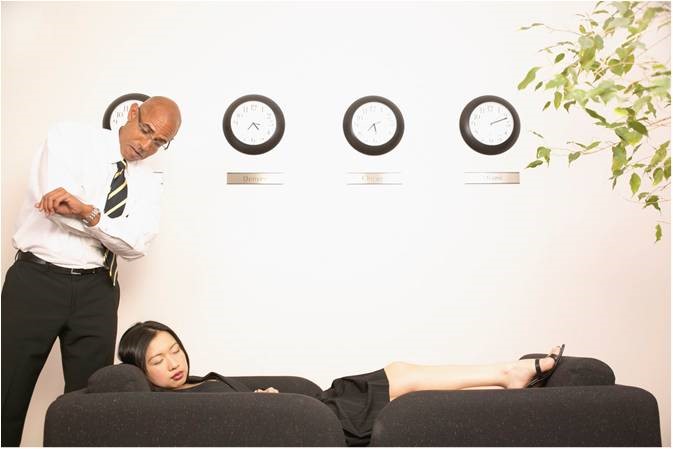Ah Sleep: The Best Work You Can Do All Day and How Color Helps

 Think that 5 hours a night is all you need?
Think that 5 hours a night is all you need?
Think again: if you aren’t getting 8 hours of sleep a night: you are sleep deprived.
You might say so what…but if you are sleep deprived you have:
- diminished IQ
- challenged immune system and
- decreased ability to be efficient or effective, impossible to show up as healthy in your relationships.
Dr. Gary Feldman (Sleep Basics for Children and Parents) states that over 47 million American adults are what is termed ‘sleep deprived’, not getting the 7-8 hours per night they need to function.
Teenagers need 9 hours per night and children need more, up to 16 hours per day for infants.
The BBC has a fun test (and a great website) where you can check your own response time to tell how sleep deprived you might be: Sheep Dash
Check out my post the Bedroom Colors: Sleep or Sex?
Keys to good sleep:
- Get enough exercise in the day to expend excess energy, release and develop endorphins. Fresh air and nature help you sleep.
- Establish a good daily routine and a good going-to-bed routine. Our body’s understand consistency and predictability and can be “programmed” with intention for rest and sleep.
- Choose the right Bedroom Color!
- Avoid televsion and electronics 45 minutes to 2 hours before sleep.
- Apps like f.lux (for pc computers) and the “Night Shift” setting on your iPhone will limit the blue-light spectrum that turns off your body’s melatonin production. At first it will seem odd, but you and your body will LOVE it.
- Limit sugar, caffeine, white flour, and eating before bedtime.
- Create a calming, “wind down” phase and make it predictable…avoid CFLs or LEDs with “Daylight” or brilliant white/blue light.
- Set up your bedroom for sleep success.
Feng Shui for good sleep:
Your bedroom is the most important room in your life and responsible for the most important activity of the day: sleep.
1. Eliminate clutter all kinds of clutter — visual clutter (too many colors, too much “stuff”), actual clutter, especially from under your bed, and energy clutter (yes THIS matters–for instance clothing from the day’s work carries the energy of stress and the outside world, a mattress that is older than 2 years or from another relationship is negative energy).
2. Colors matter: Avoid bright colors, patterns and bright lights; use calm tones; warm rich “flesh” tones (light yellows, beige to pinks, browns and cocoas) for enhancing relationships, cool tones (light green or blue) for distance and separation increasing independence. See Bedroom Colors Post
3. Remove or cover mirrors, remove vibrant art work or artwork with water in it. Limit photos of people.
4. Remove electronics and electromagnetic affects. Eliminate computers, TV, etc. Place your clock and phone across the room.
5. Monitor what you are feeding your brain before you go to bed.
6. If your bedroom is above your kitchen or a garage or headboard adjacent a water wall (bathroom) you could have sleep problems. Use the ‘mirror’ cure: place a round mirror under your bed (this will be easy because there is no other clutter there, right?) and face the reflective side down. With your intention say, “good luck with that down there, I draw the boundary for myself.”
Teenagers need more sleep…and a later start time.
My desire to stay connected to my teenage sons drove me to Michael Riera’s book, Staying Connected to Your Teenager.
In it he says, “given the current configuration of most school districts, teenagers are unintentionally set up to accumulate serious sleep debt, which in turn impinges on their moods, concentration, stress levels, and general ability to learn.”
A conservative estimate is that teens, on a weekly basis accrue a sleep debt of about 13-15 hours. “Sleep experts agree that for every hour of sleep debt we accrue, we lose one point from our function IQ.” Duh.
PS: if you want to be available to connect with your teen, hang out in the kitchen after midnight–it’s when they are ready to blab away. Be sure you are doing something, not just waiting to ambush. Your best response: ‘ah-huh, oohhhh, hmmmm, really?” It allows them to open up and not feel judged and you get SOOO much information to help them be their best self–at a later time.
Table of Contents
Categories
- Bedroom Design
- BioGeometry
- Body — Mind BODY Spirit Space
- Body's Design Needs to Thrive
- Bringing Beauty Back
- Business
- Color
- Color & Design
- Color Psychology
- Cool Stuff – Technology and Nature
- Creating Your Dreams
- Design for Health
- Design for Human Response
- Design to Thrive
- Embrace the Darkness Project
- Energy Update
- Family
- Green Living
- Health
- Healthy Home
- Healthy Work
- Home Buying & Selling
- Law of Attraction
- Life
- Life Surfing
- Mind
- Office Success
- Real Estate
- Sleep
- Space
- The Gentle SHIFT
- Trends
- Uncategorized
